持续知识共享
制定知识共享的工作方案,提升知识管理效果

制定宣传策略:利用公 司内部网络、邮件、会 议等方式进行宣传
制作宣传材料:制作知 识共享的宣传海报、手 册、视频等
制定推广时间表:根据 公司实际情况,制定合 理的推广时间表
评估推广效果:定期评 估宣传推广的效果,并 根据反馈进行调整
提供知识共享的培训和支持
培训内容:知识共享的重要性、 方法、技巧等
支持方式:提供知识共享平台、 工具、资源等
添加标题
添加标题
添加标题
添加标题
培训方式:线上、线下、混合式 等多种方式
持续改进:根据反馈和需求,不 断优化培训和支持内容
建立知识共享的激励机制和奖励措施
设立知识共享奖励基金,鼓励员 工积极参与知识共享
设立知识共享优秀个人和团队奖 项,表彰在知识共享中表现突出 的个人和团队
标签体系的建立:为每个知识内容添加相应的标签,便于检索和查找。标签可以包括 关键词、主题、来源等。
知识内容的审核和更新:定期对知识内容进行审核,确保其准确性和时效性。同时, 根据实际情况对知识内容进行更新和补充。
知识内容的共享和传播:通过企业内部网络、知识管理系统等方式,实现知识内容的 共享和传播,提高员工的知识水平和工作效率。
知识共享的意义:通过知识共享,可以促进组织内部的信息交流和合作,提高 组织的工作效率和竞争力
知识共享的方法:建立知识管理系统,鼓励员工分享知识和经验,定期组织知 识分享活动
知识共享的效果:通过知识共享,可以提高组织的创新能力和竞争力,促进组 织的发展和进步
促进团队协作和创新能力
知识共享可以提 高团队协作效率, 减少重复劳动
添加标题
添加标题
添加标题
添加标题
制定知识共享积分制度,根据员 工贡献的知识数量和质量进行积 分奖励
互相分享知识可以带来哪些好处?
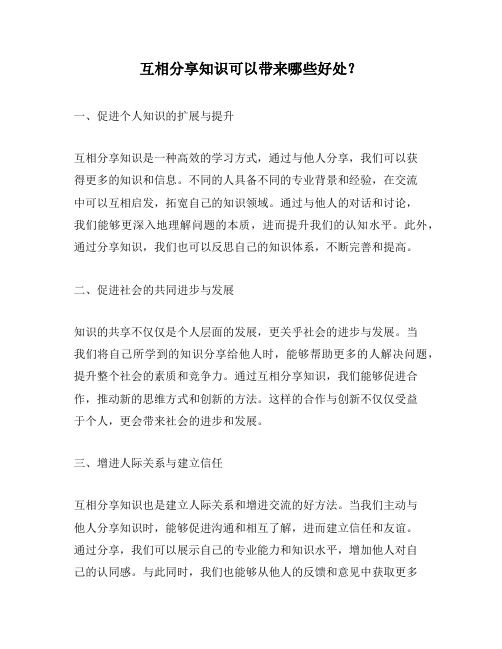
互相分享知识可以带来哪些好处?一、促进个人知识的扩展与提升互相分享知识是一种高效的学习方式,通过与他人分享,我们可以获得更多的知识和信息。
不同的人具备不同的专业背景和经验,在交流中可以互相启发,拓宽自己的知识领域。
通过与他人的对话和讨论,我们能够更深入地理解问题的本质,进而提升我们的认知水平。
此外,通过分享知识,我们也可以反思自己的知识体系,不断完善和提高。
二、促进社会的共同进步与发展知识的共享不仅仅是个人层面的发展,更关乎社会的进步与发展。
当我们将自己所学到的知识分享给他人时,能够帮助更多的人解决问题,提升整个社会的素质和竞争力。
通过互相分享知识,我们能够促进合作,推动新的思维方式和创新的方法。
这样的合作与创新不仅仅受益于个人,更会带来社会的进步和发展。
三、增进人际关系与建立信任互相分享知识也是建立人际关系和增进交流的好方法。
当我们主动与他人分享知识时,能够促进沟通和相互了解,进而建立信任和友谊。
通过分享,我们可以展示自己的专业能力和知识水平,增加他人对自己的认同感。
与此同时,我们也能够从他人的反馈和意见中获取更多的启迪和建议,不断完善自己。
四、培养学习和探索的乐趣分享知识是一种学习和探索的乐趣。
当我们将自己所学到的知识与他人分享时,能够激发我们的学习兴趣和好奇心。
通过与他人的交流和讨论,我们能够深入思考和探索,不断拓展自己的知识边界。
这种乐趣不仅仅来源于分享的过程本身,更体现在我们通过分享获得成就感和满足感。
五、提高个人口头表达能力互相分享知识也是提高个人口头表达能力的一种有效途径。
当我们将自己所学到的知识与他人分享时,需要将复杂的概念和思想用简洁明了的语言表达出来。
通过与他人的互动,我们能够提升自己的沟通能力和表达能力,更好地传达自己的观点和思考。
这种能力的提升对于我们的个人发展和职场提升都具有重要意义。
总结起来,互相分享知识有助于促进个人知识的扩展与提升、推动社会的共同进步与发展、增进人际关系与建立信任、培养学习和探索的乐趣以及提高个人口头表达能力。
如何促进团队中员工的学习与知识分享文化?

如何促进团队中员工的学习与知识分享文化?
在团队中建立学习与知识分享文化是一种重要的管理方式,能够提升团队整体的学习能力和创新力。
下面就和大家分享一些方法,帮助你促进团队中员工的学习与知识分享文化。
1. 制定明确的学习计划
为每位员工制定个性化的学习计划,根据其自身的职业发展目标和需求,提供相应的培训课程和资源,鼓励员工不断学习和提升。
2. 设立知识分享平台
建立一个专门的知识分享平台,让员工能够随时随地分享自己的学习心得、经验和见解。
可以利用内部社交工具或在线论坛来实现知识共享。
3. 定期举办内部分享会议
定期组织内部分享会议,邀请员工分享自己的学习成果和经验,激励大家互相学习和交流。
这种面对面的交流方式能够更好地促进知识的传递和碰撞。
4. 实行学习激励制度
建立学习激励制度,通过奖励机制来鼓励员工参与学习活动和知识分享。
可以设立学习达标奖励、最佳分享奖等,让员工有动力持续学习和分享。
5. 提供学习资源支持
为员工提供丰富的学习资源支持,如在线课程、培训讲座、专业书籍等。
同时也要鼓励员工利用工作之余自主学习,不断充实自己的知识储备。
通过以上方法,可以帮助团队建立积极的学习氛围,促进员工之间的学习与知识分享,进而提升整个团队的综合能力和竞争力。
让每个员工都成为学习者和分享者,共同成长与进步!
希望以上建议能够对你在促进团队学习与知识分享文化方面有所帮助!期待你们的团队能够蓬勃发展,共同创造更加美好的明天!。
知识共享的管理办法

知识共享是组织内部员工之间或组织与外部合作伙伴之间分享和传递知识的管理方法。
有效的知识共享可以促进创新、提高绩效,并增强组织的竞争力。
以下是一些常见的知识共享的管理办法:1. 建立知识共享文化:知识共享需要建立积极的知识共享文化。
组织应鼓励员工乐于分享自己的知识和经验,倡导开放、互助和学习的氛围。
领导者可以树立榜样,参与和支持知识共享,让员工感受到知识共享的重要性和价值。
2. 提供共享平台和工具:组织应提供共享平台和工具来支持知识共享的实施。
这包括内部网络、知识库、在线社区、协作工具等。
共享平台和工具应易于使用和访问,并能够促进知识的存储、搜索和传递。
3. 识别和激励知识共享者:组织应识别和激励积极参与知识共享的员工。
可以通过表彰、奖励和晋升等方式,鼓励员工分享优质的知识和经验。
这有助于激发员工的积极性,增加他们参与知识共享的动力。
4. 建立跨部门合作:知识共享应跨越部门和团队的界限。
组织可以通过设立跨部门项目组、组织交叉培训、定期举办内部研讨会等方式,促进不同部门之间的合作和知识共享。
这有助于打破信息孤岛,提高组织整体的知识水平和协作效率。
5. 鼓励学习和持续发展:知识共享应与学习和持续发展相结合。
组织应提供学习机会和资源,如培训课程、研讨会、导师计划等,以支持员工的学习和专业发展。
这可以激励员工不断学习新知识,并将其应用于工作实践中。
6. 管理知识产权和保护机制:知识共享需要管理知识产权和保护机制。
组织应建立明确的知识产权政策,保护员工的知识产权和创新成果。
同时,也要制定适当的保密和安全措施,确保敏感信息和商业机密不被泄露。
7. 建立知识管理体系:组织应建立有效的知识管理体系,以支持知识共享的流程和实施。
这包括知识的收集、整理、存储、检索和传递等方面。
知识管理体系可以帮助组织更好地组织和利用知识资源,提高知识共享的效率和质量。
8. 不断改进和评估:知识共享需要进行不断的改进和评估。
组织应定期评估知识共享的效果和影响,并根据反馈和经验进行调整和优化。
公司知识分享总结促进知识共享提高员工整体素质

公司知识分享总结促进知识共享提高员工整体素质在现代企业管理中,知识共享已成为提高公司整体素质的重要途径之一。
本文将对公司知识分享的重要性进行总结,并探讨如何促进知识共享以提高员工整体素质。
一、知识分享的重要性知识分享是指企业内部员工之间主动传递、共享和应用知识的过程。
它有助于打破信息孤岛,提高组织的学习能力和创新能力,进而提升整体素质。
具体来说,知识分享的重要性体现在以下几个方面:1.1 促进团队协作通过知识分享,员工可以将自己的专业知识与经验传授给其他人,从而提高整个团队的综合能力。
知识分享能够促进团队成员之间的相互学习和互动,增强协作意识,共同完成团队任务。
1.2 加速问题解决在企业中,员工常常会面临各种各样的问题。
通过知识分享,员工能够及时获取到其他同事的经验和解决方案,从而快速解决问题。
这样不仅能提高工作效率,还能避免重复劳动,提升整个团队的工作质量。
1.3 鼓励创新与发展知识分享能够激发员工的创新思维,推动企业的持续发展。
通过学习他人的经验和知识,员工能够借鉴并改进现有的工作方法或流程,提出创新的想法,为企业带来新的竞争优势。
二、促进知识共享的方法为了促进知识共享,提高员工整体素质,企业可以采取以下几种方法:2.1 建立知识共享平台企业可以建立内部的知识共享平台,提供一个交流与学习的空间。
通过这个平台,员工可以发布和分享自己的经验和知识,同时也可以从中学习到其他同事的经验和知识。
这种平台可以是一个内部论坛、在线课程平台或者是一个基于云计算的知识库。
2.2 设立奖励机制为了激励员工积极参与知识分享,企业可以设立相应的奖励机制。
例如,可以设立知识分享的积分机制,通过累积积分来评选出优秀的知识分享者并给予相应的奖励和荣誉。
这样不仅能提高员工的积极性,还能形成一种分享文化,进一步促进知识共享。
2.3 培养学习型组织文化学习型组织是指能够持续学习、不断创新和适应变化的组织。
为了培养这种组织文化,企业需要重视员工的学习与发展。
知识管理的知识共享
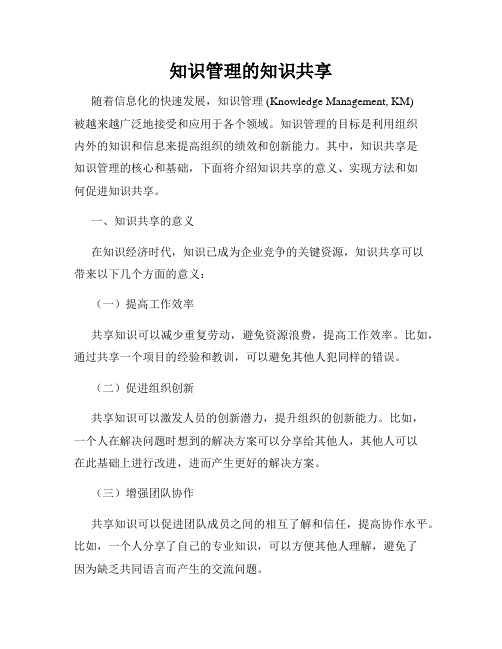
知识管理的知识共享随着信息化的快速发展,知识管理 (Knowledge Management, KM)被越来越广泛地接受和应用于各个领域。
知识管理的目标是利用组织内外的知识和信息来提高组织的绩效和创新能力。
其中,知识共享是知识管理的核心和基础,下面将介绍知识共享的意义、实现方法和如何促进知识共享。
一、知识共享的意义在知识经济时代,知识已成为企业竞争的关键资源,知识共享可以带来以下几个方面的意义:(一)提高工作效率共享知识可以减少重复劳动,避免资源浪费,提高工作效率。
比如,通过共享一个项目的经验和教训,可以避免其他人犯同样的错误。
(二)促进组织创新共享知识可以激发人员的创新潜力,提升组织的创新能力。
比如,一个人在解决问题时想到的解决方案可以分享给其他人,其他人可以在此基础上进行改进,进而产生更好的解决方案。
(三)增强团队协作共享知识可以促进团队成员之间的相互了解和信任,提高协作水平。
比如,一个人分享了自己的专业知识,可以方便其他人理解,避免了因为缺乏共同语言而产生的交流问题。
(四)推动个人成长共享知识可以让个人更好地了解自己的专业知识,从而促进个人成长。
比如,一个人分享了自己的工作经验,可以从中发现自己的不足和优点,进而加以改进和巩固。
二、实现知识共享的方法为了实现知识共享,需要采取以下几种方法:(一)建立知识库知识库是存放企业内部和外部知识的仓库,包括文档、资料、经验、案例等。
通过建立知识库,可以使组织内的员工更加便捷地获取和共享知识。
(二)举办经验分享会组织内部可以定期举行经验分享会,让员工分享自己在工作中的经验和心得体会。
此外,企业也可以邀请外部专家来分享行业经验。
(三)建立专家库企业可以建立专家库,将专家的信息存储在其中,供员工查找和联系。
当员工有问题需要解决时,可以通过专家库找到相应的专家解决问题。
(四)建立社交平台企业可以建立自己的社交平台,供员工之间交流和分享知识。
此外,企业也可以加入一些公共的社交平台,比如知乎、微博等,以便吸引更多的人来分享和获取知识。
(知识管理)知识共享三项规定
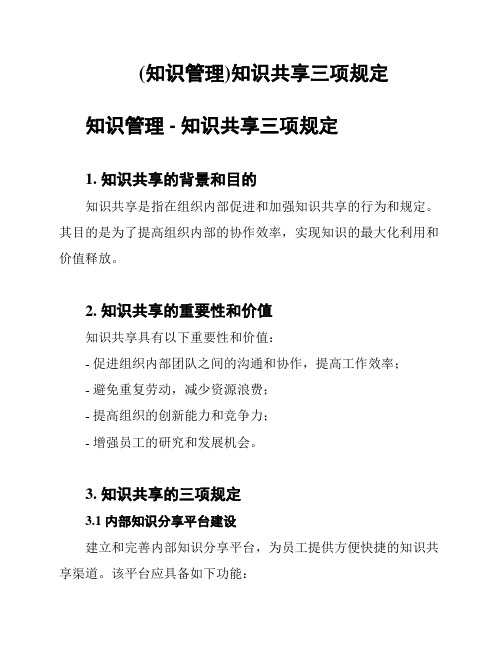
(知识管理)知识共享三项规定知识管理 - 知识共享三项规定1. 知识共享的背景和目的知识共享是指在组织内部促进和加强知识共享的行为和规定。
其目的是为了提高组织内部的协作效率,实现知识的最大化利用和价值释放。
2. 知识共享的重要性和价值知识共享具有以下重要性和价值:- 促进组织内部团队之间的沟通和协作,提高工作效率;- 避免重复劳动,减少资源浪费;- 提高组织的创新能力和竞争力;- 增强员工的研究和发展机会。
3. 知识共享的三项规定3.1 内部知识分享平台建设建立和完善内部知识分享平台,为员工提供方便快捷的知识共享渠道。
该平台应具备如下功能:- 分类整理知识资源,便于搜索和查找;- 支持员工发布和共享自己的知识;- 提供评论和讨论的功能,促进交流和反馈。
3.2 知识共享的奖励机制建立知识共享的奖励机制,激励员工积极主动地参与知识共享。
奖励机制可以包括以下措施:- 设立奖励制度,对知识贡献者进行表彰和奖励;- 建立知识共享贡献排行榜,鼓励员工积极参与;- 组织知识共享交流活动,提升员工的参与度和乐趣。
3.3 知识共享的保护措施在推行知识共享过程中,需要考虑知识的保护和机密性。
以下是一些保护措施的建议:- 确定知识共享的范围和权限,避免敏感信息的泄露;- 明确知识共享的规则和流程,加强对知识的控制和管理;- 加强员工的保密意识,建立知识保护的文化氛围。
结论通过建立合理的知识共享规定,可以促进组织内部的协作和创新,提高工作效率和竞争力。
同时,需要注意保护知识的机密性,确保知识共享的安全和可持续发展。
团队合作中如何促进知识共享和学习

团队合作中如何促进知识共享和学习在当今竞争激烈的时代,团队合作的重要性日益凸显。
一个高效的团队不仅能够汇聚各方的智慧和力量,更能通过促进知识共享和学习,不断提升团队的整体能力,从而更好地应对各种挑战和机遇。
那么,在团队合作中,我们应该如何有效地促进知识共享和学习呢?首先,建立开放和信任的团队文化是促进知识共享和学习的基础。
当团队成员之间充满信任,他们会更愿意分享自己的知识和经验,而不用担心被嘲笑或批评。
这种开放的氛围能够让每个人都感到舒适和安全,从而积极地参与到知识交流中来。
为了营造这样的文化,团队领导者可以定期组织团队建设活动,增进成员之间的了解和感情。
例如,组织户外拓展、聚餐或者小组讨论等活动,让成员们有更多的机会相互交流和互动。
同时,领导者也要以身作则,积极分享自己的知识和经验,展现出开放和乐于分享的态度。
其次,搭建有效的沟通平台对于知识共享和学习至关重要。
在团队中,可以利用各种工具和渠道来促进信息的流通。
比如,建立内部的知识库,让成员们能够将自己的知识和经验整理成文档上传,方便其他人查阅和学习。
还可以使用即时通讯工具、视频会议等方式,让成员们能够随时随地进行交流和讨论。
此外,定期的团队会议也是一个很好的沟通平台,在会议上,成员们可以分享自己的工作进展和遇到的问题,共同探讨解决方案,从而实现知识的共享和学习。
清晰明确的目标和分工也是促进知识共享和学习的重要因素。
当团队成员清楚地知道团队的目标以及自己在其中的角色和职责时,他们会更有针对性地进行知识的共享和学习。
例如,如果一个项目的目标是开发一款新的产品,那么负责技术研发的成员会主动学习相关的技术知识,并与负责市场调研的成员分享,以便更好地了解市场需求和产品定位。
为了确保目标和分工的明确,团队领导者在项目开始前,应该与成员们进行充分的沟通和讨论,制定详细的计划和任务分配表。
鼓励成员之间的互相学习和指导也是必不可少的。
在团队中,每个成员都有自己的优势和特长,通过互相学习,可以取长补短,共同进步。
知识管理中知识共享的作用及其实现方法

知识管理中知识共享的作用及其实现方法知识管理在现代社会中起着越来越重要的作用,因为知识管理可以帮助企业或组织更好地管理和利用自身的知识资产,提高企业或组织的运作效率和创新能力。
而在知识管理中,知识共享是很重要的一环。
本文主要讨论知识共享的作用及其实现方法。
一、知识共享的作用1、促进组织内部的沟通和协作知识共享可以促进组织内部的沟通和协作。
因为在知识共享的过程中,员工之间可以分享自己所掌握的知识和经验,并且相互学习和借鉴。
这样可以让员工之间的界限越来越模糊,更加融洽地合作。
同时,知识共享还可以减少员工之间的竞争,提高组织的凝聚力和协作效率。
2、提高组织的创新能力知识共享可以提高组织的创新能力。
因为知识共享可以让员工之间掌握的知识更加广泛和深入,同时还可以让员工之间相互学习和借鉴,这样有助于激发员工的创新思维,提高企业的创新能力。
此外,通过知识共享还可以共同解决组织面临的困难,加速创新的推进。
3、节省组织的成本知识共享可以节省组织的成本。
因为在知识共享的过程中,员工可以相互学习和借鉴,从而提高工作效率,减少组织的重复劳动和浪费。
同时,知识共享还可以减少组织在新项目或者新产品开发等方面的成本,提高组织的竞争力和企业的盈利能力。
二、知识共享的实现方法1、搭建平台为了实现知识共享,组织需要搭建相应的平台。
这样可以让员工之间更加方便地共享知识和经验。
平台可以是一个内部论坛、知识图谱、博客或者其他形式的平台。
重要的是,平台需要具有简单易用、功能齐全、可持续发展等特点。
2、完善知识管理制度知识共享需要在严格的知识管理制度下进行。
组织需要建立知识共享的规范和流程,并严格执行。
比如,规定知识共享应该具备哪些要素、知识共享的方式和流程等。
只有完善的知识管理制度才能保证知识共享的效果和可持续发展性。
3、鼓励员工参与为了增强知识共享的效果,组织需要积极鼓励员工参与。
可以通过激励机制、荣誉机制、奖励机制等方式,激发员工参与知识共享的积极性和热情。
知识交流团队成员之间的知识分享

知识交流团队成员之间的知识分享在当今信息爆炸的时代,知识共享和团队合作成为推动社会进步的重要力量。
对于知识交流团队来说,成员之间的知识分享尤为重要。
本文将探讨成员之间的知识分享的意义以及有效的知识分享方法。
一、知识分享的意义知识分享是团队中的成员之间相互传递和交流知识的过程。
它不仅可以促进个体的成长和发展,还可以提高团队整体的创新能力和竞争力。
以下是知识分享的具体意义:1.加强团队协作:通过知识分享,团队成员可以互相了解和借鉴对方的知识和经验,进而提高团队的整体协作能力。
只有团队成员之间形成紧密的合作关系,才能更好地完成团队任务。
2.提高个体能力:知识分享不仅是团队成员之间的相互学习,也是个体能力提升的关键途径。
通过分享知识,一个人可以将自己的专业知识和经验传递给他人,同时也能从其他成员那里学到新的知识和技能。
3.推动创新和进步:知识分享可以为团队的创新提供源源不断的动力。
当不同领域的知识在团队中交流和碰撞时,往往会产生新的想法和创新。
这种开放式的交流氛围能够激发团队成员的潜力,推动团队的持续进步。
二、有效的知识分享方法要实现有效的知识分享,需要团队成员共同努力并采用适当的方法。
以下是一些有效的知识分享方法:1.定期例会和内部培训:团队成员可以通过定期召开团队例会和内部培训来分享知识。
在例会中,成员可以分享自己在项目中的经验和教训,讨论解决方案,共同成长。
内部培训可以针对团队成员的专业领域进行,由有经验的成员给其他成员讲解关键知识点。
2.建立知识管理平台:团队可以建立知识管理平台,用于收集、整理和共享成员的知识资源。
这个平台可以是一个内部网站、知识库或在线论坛等形式。
成员可以将自己的学习笔记、经验总结等内容上传到平台上,与其他成员共享。
3.组织专题讨论和分享会:团队可以定期组织专题讨论和分享会,让成员就某个特定话题进行深入的交流和分享。
这样可以促进成员之间的思想碰撞和知识交流,推动团队整体的学习和进步。
知识无限知识分享策划方案
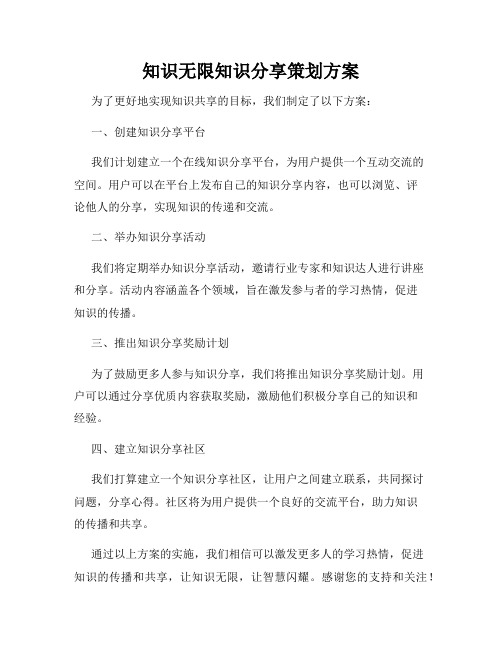
知识无限知识分享策划方案
为了更好地实现知识共享的目标,我们制定了以下方案:
一、创建知识分享平台
我们计划建立一个在线知识分享平台,为用户提供一个互动交流的
空间。
用户可以在平台上发布自己的知识分享内容,也可以浏览、评
论他人的分享,实现知识的传递和交流。
二、举办知识分享活动
我们将定期举办知识分享活动,邀请行业专家和知识达人进行讲座
和分享。
活动内容涵盖各个领域,旨在激发参与者的学习热情,促进
知识的传播。
三、推出知识分享奖励计划
为了鼓励更多人参与知识分享,我们将推出知识分享奖励计划。
用
户可以通过分享优质内容获取奖励,激励他们积极分享自己的知识和
经验。
四、建立知识分享社区
我们打算建立一个知识分享社区,让用户之间建立联系,共同探讨
问题,分享心得。
社区将为用户提供一个良好的交流平台,助力知识
的传播和共享。
通过以上方案的实施,我们相信可以激发更多人的学习热情,促进
知识的传播和共享,让知识无限,让智慧闪耀。
感谢您的支持和关注!。
知识共享制度

知识共享制度知识共享制度是一种旨在促进知识流通和共享的机制,通过开放获取和利用知识资源,推动创新和社会进步。
本文将从知识共享的定义、历史、原则及其对社会的影响等方面进行探讨。
一、知识共享的定义知识共享是一种知识管理与知识传播的理念和实践,通过采用开放的授权和许可,使其他人可以自由地获取、使用和再创造知识。
这种机制旨在突破传统知识保护的壁垒,促进知识的共享、合作与创新。
二、知识共享的历史知识共享的概念最早可以追溯到19世纪末的图书馆运动和学术自由运动。
20世纪末至21世纪初,随着数字化技术的快速发展和互联网的普及,知识共享进入了一个新的发展阶段。
如今,开源软件、在线教育和科学研究共享平台等已成为知识共享的代表。
三、知识共享的原则1. 自由获取:知识共享的原则之一是允许任何人免费获取知识。
这意味着作品的作者授权其他人自由使用、复制和传播其作品。
2. 署名要求:在知识共享的许可证中,作者通常会要求他人在使用、修改或传播其作品时必须给予适当的署名。
这样可以确保著作权归属的透明和尊重作者的知识产权。
3. 共享同样的许可:知识共享要求他人在使用、修改或传播他人作品时必须采用相同的许可方式。
这样可以形成一个良性循环,促进知识的不断传播和创新。
四、知识共享对社会的影响知识共享制度对社会产生了积极的影响。
1. 促进创新:知识共享使得知识资源能够更加广泛地流通和利用,为创新提供了更多的机会和资源。
通过共享知识,不同领域的专家和从业者可以相互学习、交流,激发更多的创新思维和合作机会。
2. 加速发展:知识共享可以推动科学研究和技术进步的发展。
研究人员可以共享自己的成果和数据,使得其他人能够更快地建立在其基础上的研究,从而促进科学发展的速度和质量。
3. 促进教育公平:知识共享使得教育资源更加开放和平等。
通过共享教材、教学视频和在线课程等,学生可以无论时间和地点限制地获取高质量的教育资源,促进了教育的普惠和公平。
4. 促进社会参与:知识共享的实践使得公众更容易参与到知识创作、审查和使用过程中。
如何有效地进行知识共享

如何有效地进行知识共享知识共享是指通过信息传播、协同学习和知识分享等方式,将知识传递给他人,促进知识的共同拥有和应用。
在现代社会,知识共享已经成为一种重要的工具,可以提高个人和组织的创新能力和竞争力。
然而,如何进行有效的知识共享,使得知识能够被广泛传播和应用,成为了一个值得探讨的问题。
本文将在此展开讨论,旨在揭示一些有效的知识共享方法和实践。
1. 建立知识平台知识平台是进行知识共享的基础。
通过建立知识管理系统、在线协作平台或者创新中心等,可以集中整理和存储知识资源,方便员工或用户随时获取和共享。
在知识平台上,可以通过分类目录、标签、搜索功能等工具,提高知识的查找和利用效率。
同时,建立一个积极的知识共享文化,鼓励员工将自己的知识和经验分享给他人,可以有效地促进知识的传播。
2. 创造良好的交流氛围为了有效地进行知识共享,必须创造一个良好的交流氛围。
组织各种形式的交流活动,例如研讨会、工作坊、分享会等,提供一个共享经验和学习的平台。
此外,面对面的交流是最直接和高效的方式,可以促进知识的交流和理解。
因此,建议组织定期的面对面会议或者鼓励团队间的沟通和合作,以便更好地进行知识共享。
3. 培养专家和导师专家和导师在企业或组织中起到举足轻重的作用。
通过培训计划、工作轮岗制度和导师制度等,可以培养和发现组织内的专业人士,并鼓励他们分享自己的专业知识和经验。
此外,定期举办专家讲座或者邀请行业内的专家进行交流,也有助于在更广泛的范围内进行知识共享。
4. 借助社交媒体平台互联网和社交媒体的快速发展为知识共享提供了更多的机会。
利用社交媒体平台,如微信公众号、知乎、博客等,可以扩大知识的传播范围,并吸引更多的参与者。
企业或组织可以建立自己的官方账号,发布有价值的内容,并与用户进行互动。
此外,通过参与行业论坛和社区,也可以积极地参与到知识共享的网络中。
5. 开展培训和教育活动培训和教育活动是一种非常有效的知识共享方式。
组织内部可以通过举办培训班、讲座、课程等形式,将专业知识传授给员工。
知识共享制度

知识共享制度知识共享制度是指以开放授权的形式,使知识和信息能够自由流通、共享和利用的一种制度安排。
它旨在促进知识的传播、创新和合作,推动科学、文化和教育的发展,为社会的进步和共同利益做出贡献。
知识共享制度的出现,打破了传统知识授权和保护模式的束缚,为人们提供了更加灵活、开放和可持续的知识流通方式。
一、知识共享的意义知识共享制度的实施具有以下几个重要意义:1. 促进创新和进步:知识共享鼓励创新和知识的互通有无,使得不同领域的研究者可以共享和借鉴彼此的成果,进一步推动科学技术和社会文化的进步。
2. 提高知识利用效率:知识共享使得大量的知识和信息能够公开、便捷地获取,有利于提高知识的利用效率,避免重复研究和浪费资源,从而为社会的发展和经济的增长带来积极的影响。
3. 强调社会共同利益:知识共享强调知识和信息的公共性质,鼓励知识创造者将其研究成果无偿贡献给社会,让更多人从中受益。
这有助于实现社会公平、公正和共同利益的目标。
二、知识共享的形式知识共享制度的实践主要体现在以下几种形式:1. 开放获取(Open Access):开放获取是指学术期刊、研究论文、数据集等科研成果以开放的方式发布和传播,任何人都可以免费获取和使用。
这种形式的知识共享有助于加速科学研究的进展,提高科学研究的可见性和影响力。
2. 开放数据(Open Data):开放数据是指科研数据以开放的方式发布和共享,供他人重复利用、验证研究结果或开展新的研究。
开放数据有助于提高科研的透明度和可重复性,推动科学研究的进步。
3. 开放教育资源(Open Educational Resources):开放教育资源是指教学设计、教学课件、课程计划等教育资源以开放的形式发布和共享,任何人都可以免费获取和使用。
开放教育资源有助于提高教育资源的可及性和质量,促进全球教育的发展和公平。
三、知识共享的挑战与应对知识共享制度在实践过程中也面临着一些挑战,需要采取相应的应对策略:1. 知识产权保护:知识共享需要在保护知识产权的前提下实现,确保知识创造者的合法权益。
团队知识共享——促进知识交流与共享的工作计划

团队知识共享——促进知识交流与共享的工作计划在知识爆炸的时代,知识不再是个人的私有财产,而是团队的共同财富。
只有让知识在团队内部自由流动、共享,才能使整个团队持续进步,不断创新。
为此,我们制定了一份旨在促进团队内部知识交流与共享的工作计划,希望通过这份计划,将我们的团队打造成一个学习型、创新型的高效团队。
一、明确共享目标我们要明确团队知识共享的目标。
这个目标不仅仅是提高个人的知识水平,更重要的是促进团队整体的知识积累和进步。
我们要让每个团队成员都认识到,知识的共享是一种责任,也是一种能力。
二、建立共享平台为了方便团队成员之间的知识交流,我们需要建立一个易于使用的共享平台。
这个平台可以是一个内部网站、一个社交软件群组,或者是一个定期召开的线下交流会。
通过这个平台,大家可以方便地发布自己学到的新知识、分享工作经验、提出问题和解答疑惑。
三、制定共享规则为了让知识共享更加有序、高效,我们需要制定一些基本的共享规则。
比如,鼓励大家积极分享自己的知识,但也要尊重他人的知识产权;在提问和回答问题时,要保持耐心和礼貌,避免产生不必要的争执;对于重要的共享内容,要定期整理归档,方便大家查阅。
四、激励共享行为为了激发团队成员参与知识共享的积极性,我们需要建立一种激励机制。
这种机制可以是物质奖励,比如设立一个“知识共享之星”的荣誉称号,并给予一定的物质奖励;也可以是精神激励,比如定期评选出优秀的共享内容,并在团队内部进行展示和推广。
五、营造共享氛围知识共享不仅仅是一种行为,更是一种氛围。
我们要努力营造一种开放、包容、互助的共享氛围,让每个团队成员都愿意分享自己的知识,也愿意从他人那里学习新知识。
这种氛围的营造需要团队领导的引导和支持,也需要每个团队成员的共同努力。
六、建立反馈机制任何计划的执行都需要一个有效的反馈机制,知识共享计划也不例外。
我们要定期收集团队成员对共享计划的意见和建议,及时调整和改进计划的内容和执行方式。
如何实现知识分享的可持续发展
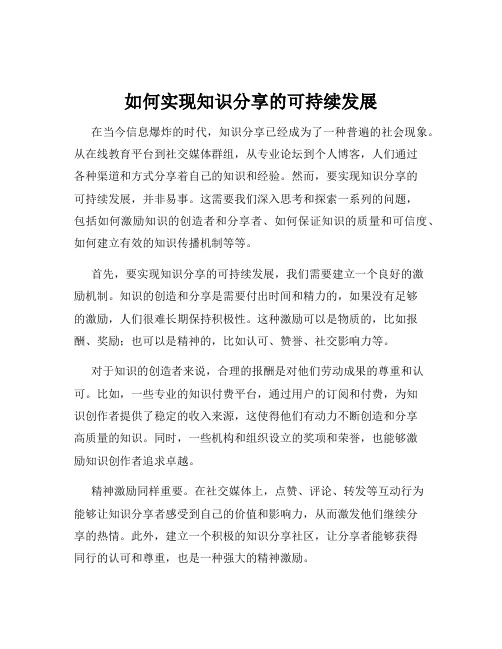
如何实现知识分享的可持续发展在当今信息爆炸的时代,知识分享已经成为了一种普遍的社会现象。
从在线教育平台到社交媒体群组,从专业论坛到个人博客,人们通过各种渠道和方式分享着自己的知识和经验。
然而,要实现知识分享的可持续发展,并非易事。
这需要我们深入思考和探索一系列的问题,包括如何激励知识的创造者和分享者、如何保证知识的质量和可信度、如何建立有效的知识传播机制等等。
首先,要实现知识分享的可持续发展,我们需要建立一个良好的激励机制。
知识的创造和分享是需要付出时间和精力的,如果没有足够的激励,人们很难长期保持积极性。
这种激励可以是物质的,比如报酬、奖励;也可以是精神的,比如认可、赞誉、社交影响力等。
对于知识的创造者来说,合理的报酬是对他们劳动成果的尊重和认可。
比如,一些专业的知识付费平台,通过用户的订阅和付费,为知识创作者提供了稳定的收入来源,这使得他们有动力不断创造和分享高质量的知识。
同时,一些机构和组织设立的奖项和荣誉,也能够激励知识创作者追求卓越。
精神激励同样重要。
在社交媒体上,点赞、评论、转发等互动行为能够让知识分享者感受到自己的价值和影响力,从而激发他们继续分享的热情。
此外,建立一个积极的知识分享社区,让分享者能够获得同行的认可和尊重,也是一种强大的精神激励。
其次,保证知识的质量和可信度是知识分享可持续发展的关键。
在信息泛滥的今天,虚假、错误、低质量的知识随处可见,如果不加以甄别和筛选,不仅会误导受众,还会损害知识分享的声誉和可持续性。
为了保证知识的质量,我们需要建立一套严格的审核和评估机制。
对于专业领域的知识分享,应该由相关的专家和权威进行审核和把关,确保其准确性和可靠性。
同时,平台也应该建立用户反馈机制,让受众能够对知识的质量进行评价和举报,对于存在问题的知识及时进行处理。
知识分享者自身也应该有高度的责任感和自律意识,确保所分享的知识是经过自己认真研究和验证的。
在分享知识时,应该注明来源和参考资料,以便受众进一步核实和深入研究。
知识共享平台与持续改进的协同作用

知识共享平台与持续改进的协同作用一、知识共享平台概述知识共享平台是一种新兴的在线协作工具,旨在促进不同领域和背景的个人和组织之间的知识交流与合作。
这种平台通过提供高效的信息共享机制,使得知识传播和利用更加便捷和广泛。
知识共享平台的核心价值在于其能够促进知识的创新、传播和应用,从而推动社会和经济的发展。
1.1 知识共享平台的核心特性知识共享平台的核心特性主要包括以下几个方面:- 易于访问:平台应设计为用户友好,易于访问和使用,确保不同背景的用户都能方便地获取和分享知识。
- 多样性:平台应支持多种形式的知识内容,包括文本、图像、视频、音频等,以满足不同用户的需求。
- 互动性:平台应具备良好的互动机制,鼓励用户之间的交流和讨论,促进知识的深入理解和应用。
- 安全性:平台应确保知识内容的安全存储和传输,保护用户隐私和知识产权。
1.2 知识共享平台的应用场景知识共享平台的应用场景非常广泛,包括但不限于以下几个方面:- 教育和培训:提供在线课程、讲座和研讨会,促进知识的传播和学习。
- 科研合作:支持科研人员之间的协作,共享研究成果和数据,推动科学进步。
- 企业创新:帮助企业通过共享最佳实践和经验,促进创新和竞争力的提升。
- 政策制定:为政策制定者提供决策支持,通过共享数据和研究成果,帮助制定更有效的政策。
二、知识共享平台的持续改进持续改进是知识共享平台发展的关键,它涉及到平台功能、用户体验、内容质量和管理机制等方面的不断优化和升级。
通过持续改进,知识共享平台能够更好地满足用户需求,提升其价值和影响力。
2.1 知识共享平台的功能改进知识共享平台的功能改进是其持续发展的基础。
这包括但不限于以下几个方面:- 用户界面优化:不断优化用户界面,提升用户体验,使其更加直观和易于操作。
- 功能扩展:根据用户需求和反馈,不断扩展平台功能,增加新的服务和工具。
- 技术支持:加强技术支撑,确保平台的稳定性和可靠性,提高数据处理和传输的效率。
知识管理与知识共享工作总结

知识管理与知识共享工作总结近年来,知识管理和知识共享在组织与团队中的重要性愈发凸显。
作为本次工作总结的主题,我将结合自己在知识管理与知识共享方面的工作经验,从以下几个方面进行总结和探讨。
一、知识管理的意义及实施情况知识管理是一种为组织提供持续发展动力的工作方式,也是对知识资源的有效利用和传承。
我们在公司积极推动知识管理的实施,制定了相应的流程和工具,并进行了专门的员工培训。
通过有效地整合和管理知识资源,我们取得了一系列令人瞩目的成果。
首先,我们建立了一个全面的知识库,将公司内部的专业知识、经验教训和最佳实践进行归纳和分类,使得员工可以方便地查找和获取所需的知识。
同时,我们也充分利用现有技术,将知识库与内部系统进行整合,实现了知识的在线共享和协同编辑,提高了工作效率和团队合作能力。
其次,我们积极鼓励员工参与知识分享和交流活动。
通过组织定期的内部论坛、研讨会以及专家讲座等形式,员工可以与同事和专业人士进行广泛的交流和分享。
这不仅有助于加深员工对专业领域的理解和认识,还促进了团队内部的沟通和合作,提高了整体创新和竞争力。
最后,我们注重知识管理的评估和持续改进。
我们建立了一套完善的知识管理指标体系,并定期进行评估和反馈。
通过分析评估结果,我们可以了解到知识管理的效果和存在的问题,并及时采取相应的措施进行改进,提高知识管理的质量和效率。
二、知识共享的作用及推进情况知识共享是知识管理的重要环节,是实现知识流动和创新的关键。
在公司内部,我们积极推动知识共享的实施,促进各业务部门和团队之间的沟通和协作,取得了一系列显著的成果。
首先,我们搭建了一个开放和透明的知识共享平台。
该平台可以方便地将各类知识内容进行整合和发布,包括技术文档、项目经验、解决方案等。
同时,我们也鼓励员工通过博客、论坛和微博等社交媒体形式进行知识的分享和交流,实现了随时随地的知识共享。
其次,我们注重知识共享的价值评估和激励机制。
我们建立了一套奖励制度,鼓励员工主动分享知识和经验。
管理办法促进组织学习与知识共享

组织学习和知识共享是现代组织管理中至关重要的一环,有助于提升员工能力、促进创新和持续改进。
以下是一些管理办法,可用于促进组织学习和知识共享:1. 建立学习文化:在组织内部倡导学习的重要性,并将其视为组织文化的一部分。
鼓励员工不断学习和自我发展,提供学习资源和机会,如培训课程、在线学习平台等。
领导层要树立榜样,积极参与学习活动。
2. 设立知识管理系统:建立知识管理系统,以便有效地收集、存储、组织和检索知识资产。
利用技术工具,如内部知识库、在线社交平台等,促进知识的共享和传播。
确保知识易于获取,并保护机密信息的安全。
3. 促进跨部门合作:鼓励不同部门和团队之间的合作与交流。
组织跨部门会议、研讨会或工作坊,促进不同团队之间的沟通和知识共享。
跨职能项目团队也可以通过协作来推动知识的流动和共享。
4. 建立导师制度:设立导师制度,由有经验和专业知识的员工担任导师,指导和培养新人。
导师通过分享自己的经验和知识,帮助新人快速适应工作环境,并提供专业指导。
这种双向学习过程促进了知识的传承和共享。
5. 举办内部培训和研讨会:定期组织内部培训和研讨会,邀请内外部专家分享最新的行业趋势、知识和技能。
员工可以通过参与这些活动,不仅增加自己的知识储备,还可以与其他员工进行交流和讨论。
6. 建立社区和平台:创建一个在线社区或协作平台,让员工分享观点、经验和解决方案。
员工可以在平台上提出问题、寻求帮助,并从其他成员的回答和讨论中获得启发和指导。
这种开放式的交流和合作促进了知识的共享和协同学习。
7. 激励知识共享:建立激励措施,鼓励员工积极参与知识共享和学习活动。
例如,设立奖励机制,表彰那些在知识分享、解决问题或帮助他人方面有突出贡献的员工。
这样可以增加员工对知识共享的积极性和参与度。
8. 组织跨部门项目和任务:通过组织跨部门的项目和任务,鼓励不同团队之间的合作和知识交流。
这种跨功能的工作方式可以促进不同团队之间的互动和学习,推动知识的流动和共享。
知识共享的有效推动

知识共享是促进组织学习和创新的重要方式,可以提高团队协作能力、加速问题解决、提高工作效率等。
以下是一些有效推动知识共享的方法:1. 建立开放的沟通文化:组织应倡导开放、透明和积极的沟通文化。
鼓励员工分享经验、见解和学习成果,使每个人都感到被尊重和听取。
这种文化可以打破信息壁垒,促进知识的自由流动。
2. 提供合适的平台和工具:组织应提供合适的平台和工具,方便员工进行知识共享。
这可以包括内部社交媒体平台、在线协作工具、知识库等。
通过这些平台和工具,员工可以方便地分享和获取知识,进行讨论和协作。
3. 鼓励跨部门和跨团队合作:组织应鼓励跨部门和跨团队合作,促进不同团队之间的知识共享。
定期组织跨部门的会议、项目合作或知识共享活动,让各部门之间的专业知识和经验得以交流和传递。
4. 建立专业社群和知识分享活动:组织可以建立专业社群或兴趣小组,聚集具有相同兴趣或专业背景的员工。
通过定期举办知识分享活动、研讨会或专题讲座,促进成员之间的知识交流和学习。
5. 设立奖励与认可机制:组织可以设立奖励与认可机制,鼓励员工积极参与知识共享。
这可以包括向知识共享者颁发奖项或提供晋升机会,以及公开表彰他们在知识共享中的贡献。
这样能够激发员工的积极性和主动性。
6. 培养知识管理的意识和能力:组织应培养员工的知识管理意识和能力。
这包括帮助员工整理、归纳和分享他们的知识和经验,并将其存储到可访问的知识库中。
同时,培训员工如何有效地搜索和利用已有的知识资源。
7. 领导示范和推动:领导层应以身作则,积极参与知识共享并示范其重要性。
领导可以分享自己的经验和见解,鼓励下属参与知识共享,并提供支持和资源。
领导的推动是促进知识共享的重要驱动力。
8. 持续评估和改进:组织应定期评估知识共享的效果,并根据评估结果进行改进。
这包括收集员工反馈、测量知识共享的影响和效益,发现潜在问题并采取相应的措施加以解决。
9. 建立学习型组织文化:最重要的是,组织应建立学习型组织文化,将知识共享作为一种价值观和行为习惯来推崇。
- 1、下载文档前请自行甄别文档内容的完整性,平台不提供额外的编辑、内容补充、找答案等附加服务。
- 2、"仅部分预览"的文档,不可在线预览部分如存在完整性等问题,可反馈申请退款(可完整预览的文档不适用该条件!)。
- 3、如文档侵犯您的权益,请联系客服反馈,我们会尽快为您处理(人工客服工作时间:9:00-18:30)。
Title:What drives continued knowledge sharing? An investigation of knowledge-contribution and -seeking beliefs题目:是什么推动持续的知识共享?通过知识贡献和知识追求信念的调查,可以回答这个问题。
AbstractKnowledge management (KM) research has yielded extensive explanations regarding the individual's motivation to share knowledge, each with different sets of factors. Yet the study of continued knowledge sharing is rare. There has been little research investigating this issue from contributing and seeking perspectives—the two distinct, but closely interrelated, facets of continued knowledge sharing. We propose that knowledge management system (KMS) users' beliefs are contextually differentiated, and thus a distinction between knowledge-contribution and knowledge-seeking behaviors and an adequate emphasis on their variance in terms of user belief is needed. By incorporating the knowledge-contribution and knowledge-seeking perspectives in a single study, we model and examine the differences among driving factors in two behavioral contexts, provide the conceptual comparisons and preliminary discussions, and thus advance our understanding of continued knowledge sharing via the KMS.摘要关于个人分享知识的动机,知识管理(KM)的研究已经取得了广泛的解释,每个都有不同的因素。
然而,这项持续知识共享的研究是罕见的。
很少有研究从两个不同角度的贡献和寻求调查这个问题,但继续知识共享的各个方面却密切联系。
我们提出知识管理系统(KMS)用户的信念是语境分化的,从而知识贡献和寻求知识的行为的区分是必要的,以及就用户的信念而言,适当的强调他们的方差也是必要的。
通过一个单一的研究,来整合知识贡献和知识寻求的观点,在两个行为语境中我们模仿和检查驱动因素之间的差异,提供概念的比较和初步讨论,从而推进我们通过KMS对持续的知识共享理解。
6. Discussion6.1. Discussion of the empirical resultsOur findings provide strong support for the proposed KMS continuance model. In agreement with other scholars [10],we find that habit exhibits a strong moderating effect on the relationship between intention and behavior in both contexts. Thus, this study is the first to test the role of user habit in knowledge-sharing settings. The significant result regarding facilitating conditions recon firms the conclusions found in prior studies of knowledge sharing [7,38] , that facilitating conditions matter in knowledge-seeking behavior. Notably, our analysis reveals that organizational resources and facilitating conditions are also very important, and probably more important, for continued knowledge-contribution behaviors. In particular, we find that the explanatory power of the facilitating conditions is slightly weakened in the seeking perspective. One plausible reason is that in the need-driven behaviors such as knowledge seeking, intention is still the main causal mechanism used to explain why people continue or discontinue using an IS.6.1实证结果的讨论我们的研究结果对KMS继续模型提供了强有力的支持。
与其他学者[ 10 ] 达成一致,我们发现,在这两种情况下的意图和行为之间的关系,习惯具有很强的调节作用。
因此,这项研究是首次测试用户习惯在知识共享环境中的作用。
关于促进条件侦察公司在知识共享[ 7,38 ]之前研究发现的结论的重要结果是:促进条件在知识寻求行为上有很大的关系。
值得注意的是,我们的分析表明,组织的资源和便利的条件也很重要,也许更重要的是,持续的知识贡献行为。
特别是,我们发现在寻求的角度来看,提供便利条件的解释力略有减弱。
我们发现解释力的便利条件稍微削弱在寻求视角。
一个可能的原因是:需要驱动的行为如知识寻求,意图仍是主要用来解释人们为什么继续或中止使用IS的因果机制。
Social relationship is found to represent a significant aspect of the KMS user's belief in both contexts. It has been widely realized that social relationship can affect an individual's attitude toward knowledge sharing (e.g.,[8,13,57] . Our study not only echoes the findings of prior studies but also highlights the importance of social relationship in knowledge-seeking scenarios, thus advancing the understanding of how social relationship, one of the most significant aspects of user belief, affects KMS users' attitude and intention, and eventually determines the KMS continuance behavior.在识贡献和知识追求的背景下,社会关系被发现是呈现KMS用户信念的一个重要方面。
它已被广泛认识到,社会关系能影响个体知识共享的态度(如,[8、13、57])。
我们的研究不仅呼应了之前的研究结果,而且也凸显了社会关系在寻求知识场景的重要性,从而推进如何理解社会关系,从用户信念的角度看,最重要的一个方面是影响用户的态度和意图,并最终决定了知识管理系统持续的行为。
Contrary to the commonly held notion, a seeker's knowledge growth shows to be a nonsignificant factor in forming the seeking belief for KMS usage, a finding that is both surprising and interesting. The research subjects included in a prior study by Bock et al. [7], where a significant relationship between knowledge growth and EKR usage was found, were MBA students in a large university. Student goals are by definition aligned with knowledge growth. Our results imply that corporate employees' intrinsic motivation for seeking knowledge for the sake of growing knowledge may not be as salient as that of students in the educational setting. Indeed, in a study of 182 sales teams in a management consulting company, Haas and Hansen[29] found thatsharing codified knowledge in the form of electronic documents can save time during the task, but does not necessarily improve the individual's competence. Likewise, Kane and Alavi [36] argued that using the electronic knowledge repositories seldom contributes to the seeker's knowledge growth or long-term learning. Based on our results, we maintain that in the context of a corporate environment, the ultimate goal for employees to use a KMS is not to learn new things, but rather to perform their jobs more efficiently and effectively. The current study thus extends the prior research by further investigating the knowledge growth–KMS usage behavior linkage in a broader task context.与普遍持有的观念相反,一个求职者的知识增长为形成寻求知识管理系统使用的信念没有显著的因素,这项发现是令人惊讶的、有趣的。
